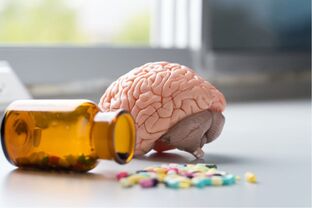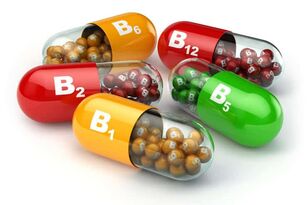Dear reader! Have you ever felt that your brain is tired of working, and your memory is starting to fail? I assure you: most people on the planet face such a sensation. Of course, too much work, great influence, chronic illness, stress, just aging, for which the body fights with the help of nutrients, should be blamed in all respects. As a result, our brains do not always have enough vitamins and minerals, because the saturation of food with vitamins and minerals, as you know, leaves much to be desired. And it takes a few weeks to drink vitamin and mineral complexes, and everything is getting better. Let's see which vitamins are best for improving brain function and memory.
What vitamins does the brain need?
The brain is the main organ in our body that is responsible for regulating the work of all organs and systems. Due to stress, malnutrition, disease, hormonal imbalances, the effectiveness of its function decreases.

Vitamins play an important role in the functioning of the central nervous system. Called organic compounds of various chemical properties. They are found in food and together they enter the body. Our bodies produce some of it ourselves. But due to low immunity, low quality products, these compounds are often deficient in our body. And the brain is the first to respond to that deficiency. Memory is disturbed, concentration decreases. Every system or organ in the body needs certain biological nutrients, vitamins and minerals more than others. For example, hair needs biotin, zinc, selenium (I wrote about vitamins for hair), the immune system needs vitamins B, C, vit. D3, the female body needs vit. A, E, group B, after giving birth, a woman also needs vitamins.
Personally, I am in favor of natural vitamins, in food, in ingredients, extracts and I have written a lot about this, but sometimes the body needs to be supported by drugs, and at certain moments of their lives justrequired.
And so as not to be confused about which products contain vitamins, read the article "We choose vitamins in products by color. "
Children really need regular vitamin intake. Their bodies grow rapidly and need nutrients to build new cells. To compensate for the lack of vitamin compounds, doctors advise drinking pharmaceutical preparations with synthetic analogues.
Of the large number of compounds beneficial to the body, note the following ingredients that are essential for normal brain function.
Beta Carotene and Vitamin A
Beta-carotene is a compound that is converted to vitamin A under the influence of pigment dyes. The connection prevents the deterioration of thinking.
Vitamin group B
This group includes a number of vitamin compounds that are useful for both adults and children. They are powerful antioxidants. If they are not enough in the body, the neurotransmitters are destroyed. Each type of vitamin affects the brain in its own way:
- B1 (tiamin).A large amount of material is found in the brain and central nervous system. It greatly affects memory. The compound prevents brain aging by providing oxygen to tissues. With vitamin B1 deficiency, depression, weakness, and fatigue develop.
- B2 (riboflavin).These compounds energize the body, stimulating active brain work. If vitamins are not enough, fatigue can be felt.
- B3 (nicotinic acid).Materials needed for enzyme synthesis. The compound helps the body produce energy, supplying it to the brain.
- B5 (pantothenic acid).Vitamins are very unstable; quickly crushed while cooking. This connection is responsible for long-term memory, information transfer between brain cells. These compounds protect the brain from the effects of nicotine and alcohol.
- B6 (pyridoxine).Relationships improve thinking ability, prevent depression. To provide this substance to the body, it is better to take vitamin preparations.
- B9 (folic acid).Vitamins are responsible for memory, normal functioning of the nervous system, energizing. These compounds help pregnant women give birth to healthy babies, as they are necessary for the formation of the fetal central nervous system.
- B12 (cyanocobalamin).This substance ensures the transition of the body from sleep to awake and vice versa. Bonding is also closely related to short-term memory. With B12 deficiency, difficult adjustments appear when changing time zones.

Vitamin C
We know ascorbic acid as a substance to activate the immune system. But the substance relieves mental stress, recommended for fatigue. Also, ascorbic acid, as an antioxidant, protects the brain from aging.
Vitamin D
In addition to improving the condition of the skeletal system, vitamin D, or calciferol, is needed to improve mood and memory. It protects the nervous system from diseases, including oncology, and stimulates the cardiovascular system. With calciferol deficiency, cognitive impairment occurs. Learn more about vitamin D and the foods it contains.
Vitamin K
Vicasol, or vitamin K, is used to speed up the brain, slow down the aging of brain cells, and prevent Alzheimer's disease. The compound improves cognitive performance.
Lecithin
This is the name of the phospholipid that stimulates the nervous system. With vitamin B5, it is converted to acetylcholine, the neurotransmitter responsible for the transmission of nerve impulses.
In the first years of life, the child's body receives lecithin from breast milk. Speech development, social adjustment and infant performance depend on the amount of phospholipids received. Lecithin helps adults to maintain efficiency, to feel less tired. More information on lecithin and the foods it contains.
Omega-3 fatty acids
These compounds, found in fish oil, nuts and seeds, are literally brain foods. They speed up reaction time, improve memory, and help maintain mental clarity.
Creatine
Nitrogen-containing amino acids accelerate cell regrowth. It plays an energy-saving role, providing good memory and analytical thinking. To maintain brain function, 5 g of the substance is enough.
L-tyrosine
Amino acids found in muscle tissue. It provides synthesis of adrenaline and norepinephrine, the neurotransmitter dopamine. Supplements with this material are indicated for people who work mentally. It increases concentration, increases the level of fatigue.
L-carnitine
Other amino acids that enhance memory and brain activity. If you take supplements regularly, you can activate the brain, relieve chronic fatigue, and increase efficiency.
Signs of vitamin deficiency
Several factors can damage brain cells. They gradually recover, but as they age, with malnutrition, disease and stress, the process slows down. Lack of vitamins to build cells and ensure the basic function of the central nervous system affects brain function:
- depression develops, anxiety, aggression, mood swings appear;
- memory impaired;
- bad coordination;
- disturbed sleep;
- apathy, fatigue appears;
- have a headache;
- absences appear, difficulty concentrating;
- the thought process slows down;
- weight loss, appetite;
- children have problems with study, increased fatigue.
Vitamin deficiency can hide more serious illnesses. Before taking it, it is better to see a doctor, because allergic reactions or other reactions are possible with the background of existing pathology.






































































